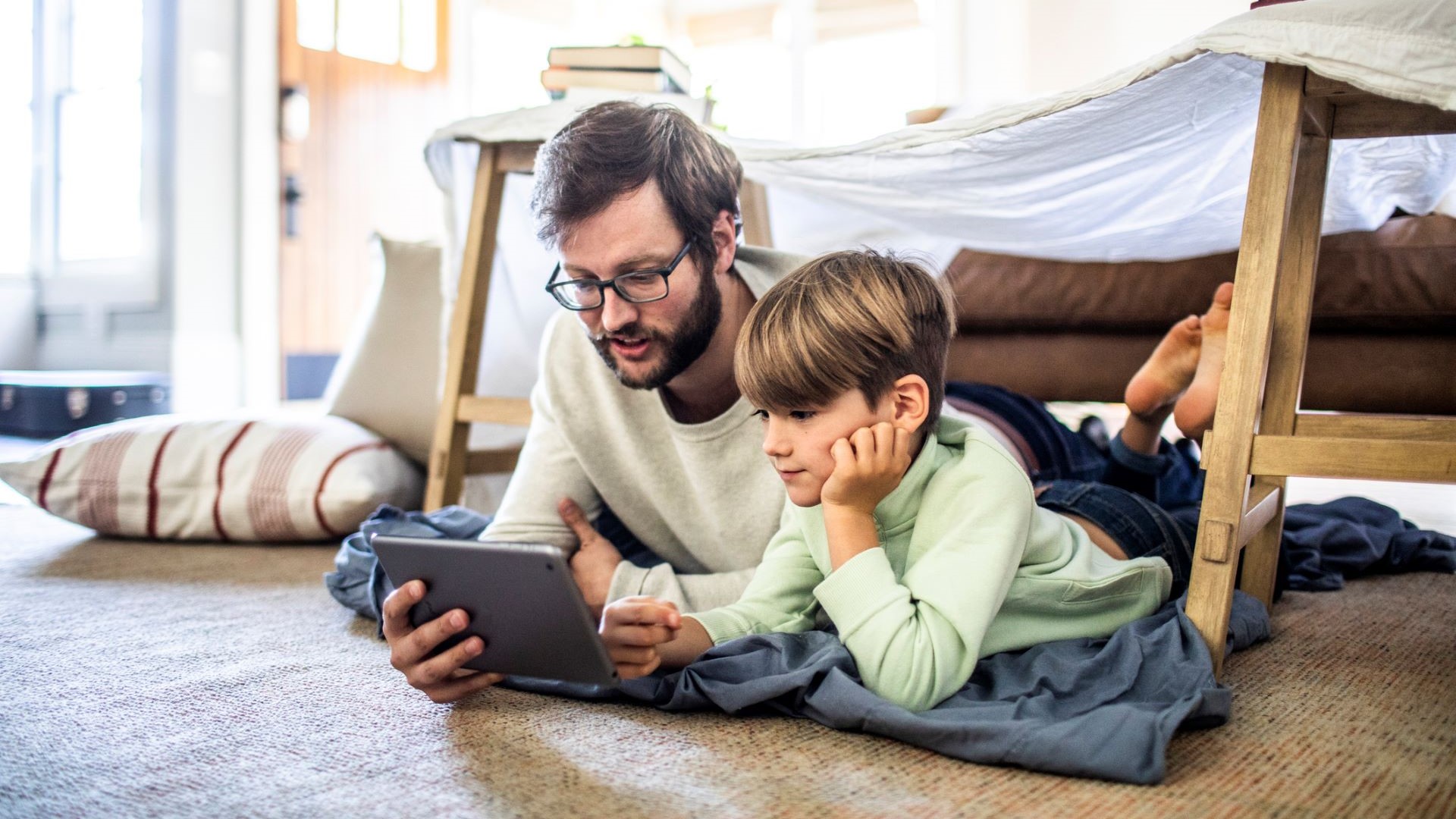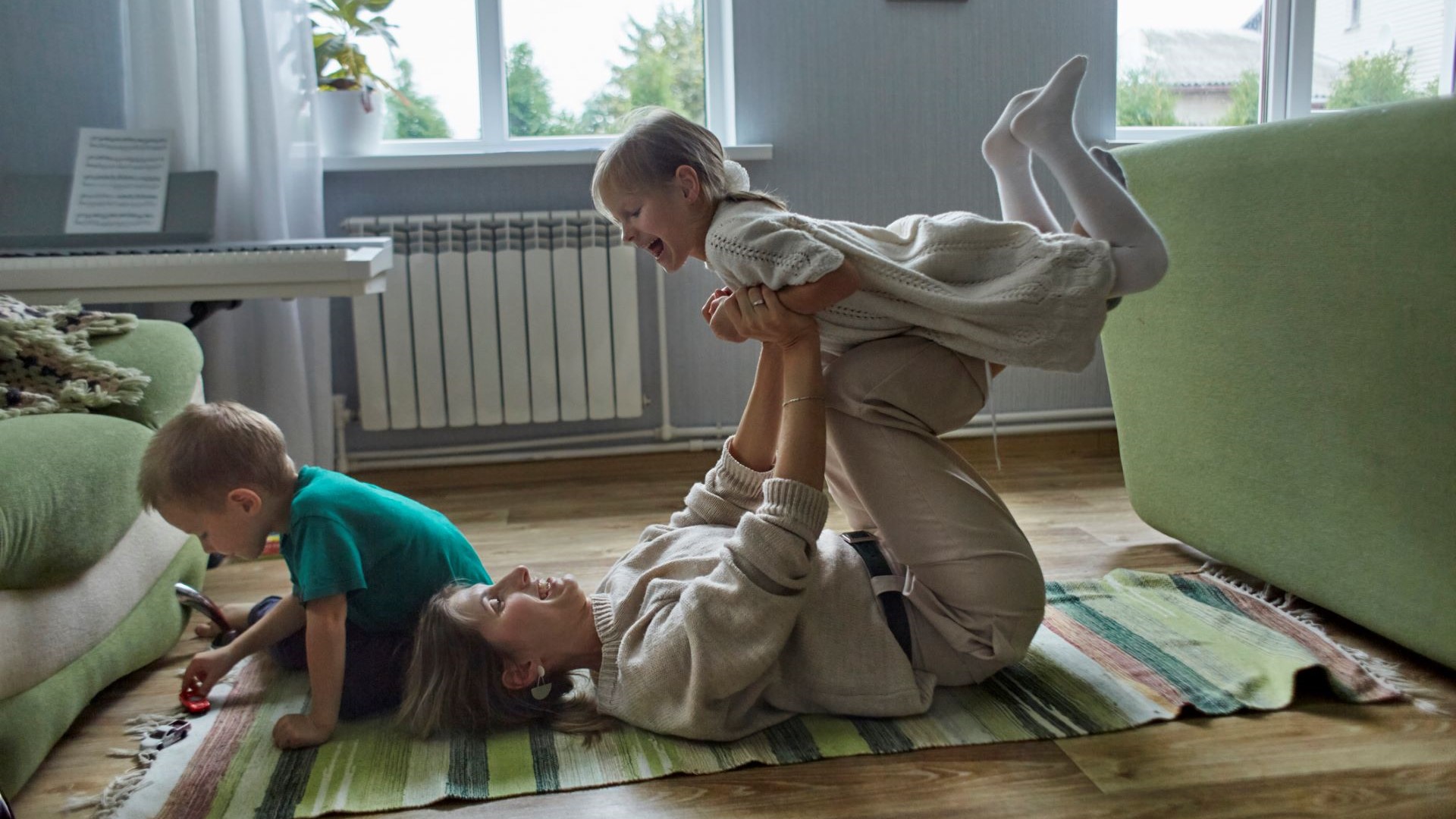How ‘slow parenting’ can improve connection with your kids – with practical examples to try
What is slow parenting? Discover the approach that encourages quality over quantity in everyday parenting tasks

If you’ve just emerged from a frantic day of juggling work, childcare, school, after-school activities, homework, dinner and TV time, this article is for you. Experts say slow parenting is all about taking one thing at a time, being more present with your kids and shutting out all the noise and distractions.
The great thing about slow parenting is that there are no set rules to follow. Compared to other parenting styles like being a tiger mama, gentle parenting and permissive parenting, there’s no right or wrong way to do it. It’s a style of parenting that you can feel your way into (slowly of course), and a way of living that you can adopt into your wider life.
“It’s simply removing all the noise around parenting,” says psychotherapist and mum-of-three Anna Mathur. “When we race around each day, trying to do as much as possible, we’re not responding to stressors or interruptions well. Slow parenting allows you to tap into your deeper reserves of attention and choose to focus on what’s in front of you.”
In this article, we’ll take you through the concept of slow parenting, its benefits for you and your kids (as well as any disadvantages) and give you some examples of where you can use it take a moment and connect with your child.
What is slow parenting?
Contrary to how it sounds, slow parenting isn’t about doing everything in slow motion. But it does mean slowing everything down and simply doing one thing at a time. It prioritises quality over quantity so that you can really focus on what you’re doing (or not doing) with your child, and make a meaningful connection.
The idea is that by slowing down and doing things at a reduced pace, we can get more from these moments of connection and more from what we do with our children, even if it’s just watching telly.
Parenting advice, hot topics, best buys and family finance tips delivered straight to your inbox.
We all want our kids to be happy, so it's understandable that often we cram as much as we can into their schedules to give them a ‘perfect’ childhood. We ferry them around constantly from activity to playdate, from after-school class to sleepover.
My 11-year-old son has football followed by scouts every Friday night. This means that the end of our working week is an exhausting juggle of Xbox, activity, dinner, Xbox, activity, arguments about having more Xbox, bed. It’s busy and stressful for us, and he hates being constantly chivvied from pillar to post. It’s not the best way to start a weekend, that’s for sure.

“We all experience a conflict between what our values tell us and what we do. It’s called cognitive dissonance,” says Mathur, an advocate of the approach. "Slow parenting helps us find a way to better reflect our values, become more resilient, and gives our kids (and ourselves) room to breathe.”
So, instead of cramming a bunch of activities into a weekend, give everyone some unstructured time to do whatever they want. Let them have some free time to read, draw or play after school, instead of trying to get the homework done before dinner.
If you tend to scroll through social media while they watch YouTube, put your phone down and watch with them. You can even, as Mathur suggests, just watch your child doing whatever it is they’re doing. Focus on their eyelashes, their little fingernails, or their expressions. You’ll find things naturally slow down and you start to notice new things about them that you often miss. You'll likely start to appreciate the small moments more.
By deliberately slowing down and being fully present, you’re showing your child that they are important, interesting, and worth your undivided attention. Parenting becomes less about planning and checking boxes and more about treasuring the moments right before you.

Anna Mathur is a psychotherapist, bestselling author, and a mum of three children. She's passionate about taking therapy out of the therapy room and loves sharing her own personal and professional experiences to support fellow mums through motherhood.
Pros of slow parenting
Although there isn’t much research into slow parenting as a concept yet, mindful parenting has a similar approach. Research shows being a mindful parent can:
- Increase your emotional warmth;
- Regulate stress;
- Improve your child’s mental health;
- Help you both bond;
- Make you a more adaptable parent;
- Help your child regulate emotions;
- Improve your wellbeing.
Supporters of slow parenting also say it helps them enjoy family time, avoid the feeling of competing with other parents, and feel more balanced overall.

Drawbacks of slow parenting
While slow parenting has many benefits, there are some potential drawbacks. “If you’re generally a people-pleaser, slow parenting can present a bit of a challenge,” says Mathur. “We’re all so used to multi-tasking that slowing down can feel like an abrupt change of pace and like you’re not getting everything done.”
Critics also argue that slow parenting can potentially:
- Leave your child feeling bored;
- Make you feel like you’re being lazy;
- Be hard if you aren’t naturally patient;
- Lack the structure that some kids need.
The key to adopting slow parenting, according to Mathur, is to ask yourself what will be most important to you when you reflect back on how you parented your child, and start from there.

How to practice slow parenting with your family
Below we've outlined several scenarios from everyday family life that can commonly be a source of stress and friction.
For each, we've explained how a slow parenting approach can help caregivers to be more present and thoughtful during these everyday tasks.
Walking to school
How it usually goes: You rush your kids to school while checking your emails on the go.
The slow parenting approach: Leave your phone in your bag and let your kids set the pace of the walk. Chat about what you see and stop to look at things that interest you.
Watching TV
How it usually goes: You scroll endlessly on social media or check work emails and answer distractedly if your child asks you something.
The slow parenting approach: Put down your device and watch with them. You’ll be surprised at how much there is to like!
Doing homework
How it usually goes: You hover over them with one eye on your phone and the other on dinner, fretting about how much you don’t know about maths these days and wondering if they’ll fail their GCSE in 7 year’s time.
The slow parenting approach: Sit with them but let them direct the process, only offering guidance if you’re asked. Focus more on their emotional wellbeing rather than their academic success.
Dinner time
How it usually goes: The TV is on, there are multiple phones on the table and everyone is eating quickly so they can get on with whatever they were doing beforehand.
The slow parenting approach: Turn the telly off and be present. Ask your kids how they got on at school and listen to their answers. Don’t feel pressure to keep up a conversation though - just let it happen naturally.
A day with no plans
How it usually goes: You give your kid a list of activities you could all do, none of which they like. After half an hour of debating you give in and they play online games or watch TV while you feel terrible for not providing something more constructive to do.
The slow parenting approach: Let your kid decide what they want to do instead, and if it’s gaming or TV, ask them if you can join in too. Maybe they can help you fold laundry or make dinner later, or you can all go for a walk. Whatever it is, try to enjoy it with them and give them the freedom to decide.
Enjoyed this article? Next up, read how to teach kids emotional intelligence, how gentle parenting could stop your kids growing up too fast, and why telling children little white lies can backfire.
Joanne Lewsley is mum to a tween, and freelance copywriter and editor who creates parenting, health and lifestyle content for evidence-based websites, including BabyCentre, Live Science, Medical News Today and more.